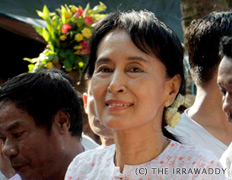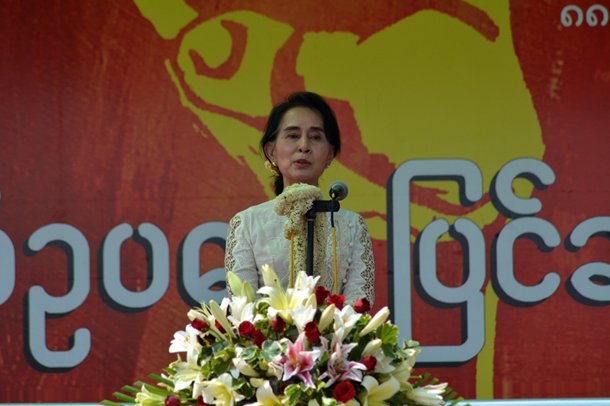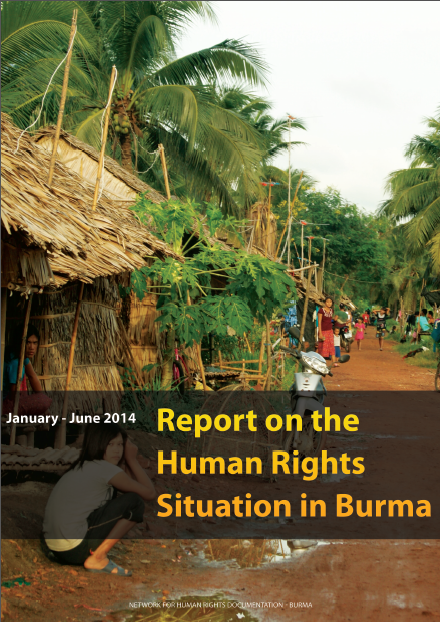
News about Daw Aung San Suu Kyi
Since her release on 13 November 2010, Daw Aung San Suu Kyi has proven that she continues to be a powerful force for social and political progress in Burma.
Follow her efforts to promote human rights, social development, democracy and national reconciliation in Burma in the following articles about her work, her words, and her long-awaited release.
Posts about ‘Daw Aung San Suu Kyi’
THREE MDCF ACTIVISTS JAILED, FOURTH ON TRIAL
Three activists from the Movement for Democracy Current Force (MDCF) have been imprisoned and a fourth is on trial, as a result of their peaceful political activities. They are prisoners of conscience […]
| |Boost for Burma with new UK funding
The UK remains committed to supporting Burma to reach its potential as a peaceful and prosperous country that respects the human rights of its entire people, International Development Minister Desmond Swayne said while announcing new funding at a reception to mark 10 years of DFID’s presence in Burma […]
| |Statement on USCIRF Visit to Burma
This is our first Commissioner-level visit to the country. We have had meetings with Union and state government officials, Rangoon-based representatives of ethnic and religious groups, representatives of non-governmental organizations, representatives of political parties, including Aung San Suu Kyi, and religious leaders. We traveled to Rangoon, Mandalay, Meiktila, and Naypyidaw. In Meiktila, we welcomed the chance to visit camps for persons from both the Muslim and Buddhist communities who were displaced by spasms of violence in March 2013 […]
| |January – June 2014: Report on the Human Rights Situation on Burma
The Network for Human Right Documentation-Burma (ND-Burma) is an organization that documents and reports human rights violations taking place throughout Burma. We are a watch-dog for human rights violations and are continually monitoring the human rights situation in Burma.
This report covers the first period of 2014 and focuses on 103 documented cases of human rights violations in Burma from January-June 2014. There are many serious human rights violations addressed and highlighted in this report, including: torture, extra-judicial killing, illegal arrests and detention, arbitrary taxation, property crimes, forced labor, human trafficking, forced displacement and rape.
Even though President U Thein Sein promised to release all political prisoners by the end of 2013, there are still many political prisoners in Burma, including new detainees in 2014. Many human right defenders and activists have been arrested under the Unlawful Association Act of 1908, Section 5 (e) and 5 (j) of the Emergency Provisions Act, and Section (18) of the Right to Peaceful Assembly and Peaceful Procession Act. For example, U Win Cho and U Nay Myo Zin were arrested under Section (18) for protesting the confiscation of land in Kyauk Ta Dar Township, Yangon. Moreover, innocent Kachin IDPs were arrested under Section (17) of the Unlawful Association Act for suspected contact with ethnic armed groups. These actions reinforce the fact that the government in Burma is still willing to use oppressive and unjust laws against the Burmese people […]
| |Political Opposition in Burma Must Ignore Distractions and Focus on Policy
 The main opposition party in Burma, the National League for Democracy (NLD), said last week that almost 5 million people signed the petition calling for constitutional reform that did the rounds from 27 May to 19 July. The petition pushed for the removal of the Burma Army’s veto on constitutional change that they have by virtue of Article 436 of the Burma Constitution. This campaign has been widely praised as a shrewd tactical move, because it would in theory unlock the door to amendments of any offending articles of the Burma Constitution that undermine democratic values and infringe upon the fundamental rights of the people. Most notably – though by no means exclusively, as the NLD and others are at pains to stress – amendment of Article 436 will in turn enable amendment of Article 59(f), which in practice bars Daw Aung San Suu Kyi running for President in the 2015 elections.
The main opposition party in Burma, the National League for Democracy (NLD), said last week that almost 5 million people signed the petition calling for constitutional reform that did the rounds from 27 May to 19 July. The petition pushed for the removal of the Burma Army’s veto on constitutional change that they have by virtue of Article 436 of the Burma Constitution. This campaign has been widely praised as a shrewd tactical move, because it would in theory unlock the door to amendments of any offending articles of the Burma Constitution that undermine democratic values and infringe upon the fundamental rights of the people. Most notably – though by no means exclusively, as the NLD and others are at pains to stress – amendment of Article 436 will in turn enable amendment of Article 59(f), which in practice bars Daw Aung San Suu Kyi running for President in the 2015 elections.
While such a public initiative is to be applauded, and the weight of support for the petition is to be welcomed, the political opposition in Burma must not allow itself to be distracted by such diversionary machinations on the part of the Burma Government and the ruling Union Solidarity and Development Party (USDP). The NLD is right that constitutional reform is essential to the establishment of genuine democracy in Burma. However, it is also time for the political opposition to test the limited democratic space that now exists in Burma, and time to start outlining a viable policy platform for government. The burden rests with the NLD and other democratic opposition parties to engineer a seismic cultural and political shift: away from politics traditionally centred on personalities and fear, and towards politics based on actual policies that will resolve people’s grievances and promote and protect their political, economic, social and cultural rights.
| |Burma/US: Kerry Should Press Rights Concerns
(New York) – US Secretary of State John Kerry should press the Burmese government during his upcoming visit to reverse Burma’s deteriorating rights situation, Human Rights Watch said today. Kerry is scheduled to visit Burma from August 8 to 10, 2014, to attend meetings of the Association of Southeast Asian Nations (ASEAN) and the ASEAN Regional Forum (ARF) […]
| |Multi-Faith Network Urges Secretary Kerry to Raise Religious Freedom Violations with Burmese Government
Members of the US-based International Religious Freedom (IRF) Roundtable, a multi-faith informal group of organizations and individuals advocating for freedom of religion or belief, have written to US Secretary of State John Kerry ahead of his visit to Burma, urging him make it a priority to discuss reported violations of freedom of religion or belief with the government […]
| |Statement of the Special Rapporteur on the Situation of Human Rights in Myanmar
Introduction:
Good evening and thank you all for coming today. I have just concluded my first official ten- day mission as Special Rapporteur on the situation of human rights in Myanmar. The objective of my visit was to assess the human rights situation in Myanmar through a better understanding of the realities on the ground. Accordingly, I sought to engage constructively with a broad spectrum of stakeholders, including Government officials, political, religious and community leaders, civil society representatives, as well as victims of human rights violations and members of the international community. I was pleased to have had a frank and open exchange of views on a range of matters related to my mandate. And I am grateful that many were so forthcoming in their views on sensitive issues […]
| |Four Detained Newspaper Journalists Appear in Court on Emergency Provisions Act Charges
Four of the seven journalists with the weekly Bi Mon Te Nay who were arrested more than two weeks ago on charges of publishing false information and threatening state security were brought before a court in the southern Rangoon suburb of Padeban on 22 July for a preliminary hearing […]
| |











 All posts
All posts